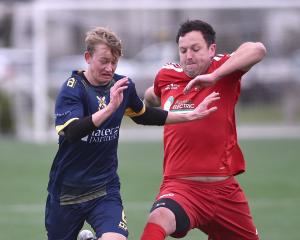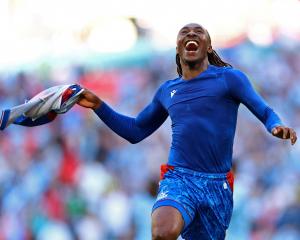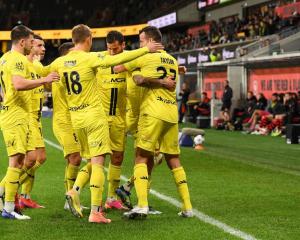Ukrainians will party for anything they deem worthy of celebration - from a new car to leaving for a holiday, which is then marked by another party upon return.
On Monday, that party encompassed a nation - and, unlike a car, actually seemed to have a purpose.
A 2-1 win over Sweden meant Ukraine took pole position in group D of the European Championship after France and England drew 1-1 earlier in the evening.
The revelry had inevitable consequences.
A large sector of the workforce turned up groggy and late on Tuesday. Some were no-shows altogether.
The capital, Kiev, has been flooded with a sense of collective euphoria and is awash with the national colours of blue and yellow.
Nowhere is the party atmosphere more apparent than in the 90,000-capacity fan zone.
In the centre of Kiev, the hard edges of the monolithic Stalinist architecture that encloses the central square, Maidan Nezalezhnosti, and main drag, Kreschatyk St, has been softened by Euro 2012 billboards.
The massive glass domes that let light into the huge mall below the square are now footballs.
This area is no stranger to celebration, with events happening on a weekly basis, but this is unprecedented.
Set up for the duration of the championship, the fan zone is impressive, row after row of beer and food tents, live music, a 150sq m screen and six additional smaller screens to show live coverage of every match.
The English are steadily arriving, but for most of the week the area has been teeming with Ukrainians and thousands of boozed and sunburned Swedes as temperatures hover around 28degC.
It's a clash of cultures, but this is where Ukrainians come into their own.
Their English is limited and despite sounding like Bond villains, they try.
They are determined to showcase their "motherland" in the best possible light, and part of that is to impress "inostranets" (foreigners).
The celebrations of Monday's victory have been ongoing, but the impact is wider. It has been a psychological shot in the arm - a welcome boost to Ukraine's flagging self-esteem.
As co-host of the tournament, Ukraine has a lot to prove.
"Creating history together" is the motto for the tournament, but a lengthy string of political disasters and scandals left Ukrainians wondering if history would be made for all the wrong reasons.
It started two years ago, when Uefa considered stripping hosting rights over missed construction deadlines and failed inspections.
Those delays became ongoing amid corruption and cronyism, with many believing the tournament is a vacuum for state funds to disappear into.
The jailing of opposition leader Yulia Tymoshenko in October was denounced by the West and President Victor Yanukovych was accused of simply removing his greatest rival.
Shortly afterwards, when street dogs started disappearing from the host cities, it was revealed authorities were slaughtering them wholesale sparking global outrage.
In April, the storm around Tymoshenko's jailing turned hurricane when she claimed to have been bashed by guards. Germany's Angela Merkel was first to protest Tymoshenko's treatment, cancelling visits to Ukraine.
Officials from other countries, including the United Kingdom, followed suit.
The same month, the city of Dnipropetrovsk was rocked by bomb blasts that injured 31 people.
In May, one week from the start of competition, the BBC dropped a bombshell of its own when flagship current affairs show Panorama aired "Stadiums of Hate".
The reasoning was to gauge if Uefa was enforcing its own "zero tolerance" policy towards racism and anti-Semitism.
It featured fans making monkey noises towards black players and brawling neo-Nazis carrying anti-Semitic banners in Poland.
In Ukraine, fans were shown delivering fascist salutes before graphic footage of students from India being beaten in the stands at a provincial match.
This was followed only days later by a brawl between deputies in Ukraine's Parliament during a debate over a Bill to allow the official use of Russian, again filmed and broadcast to the world.
The negative attention has sorely tested the patience of the citizens. Much - especially the racism charges - is perceived to be unfair.
Caught in a post-Soviet hangover, they are deeply embarrassed by and mistrustful of their government.
They are desperate to be afforded the same rights as their European neighbours.
With tongues-in-cheek, and characteristic of their rich, self-deprecating sense of humour, they also hope, after almost 21 years as a nation, the rest of the world will finally realise there is no "The" before the word Ukraine.
So far, so good.
The anticipated and hyped problems have failed to materialise and Ukrainians have a steely focus. They are determined to throw a good party.











